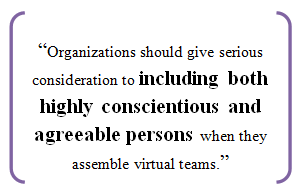Personality and Leadership in Virtual Teams
Editor’s note: We are pleased to welcome Claudia C. Cogliser and William L. Gardner of Texas Tech University, Mark B. Gavin of West Virginia University, and J. Christian Broberg of Wichita State University, authors of “Big Five Personality Factors and Leader Emergence in Virtual Teams: Relationships With Team Trustworthiness, Member Performance Contributions, and Team Performance,” published on October 29, 2012 in Group & Organization Management.
***
 As more and more organizations have come to embrace virtual teams, we quickly realized that they create unique leadership challenges. We wondered if the types of social- and task-oriented emergent leadership behaviors that are important in traditional face-to-face teams, are also important within a virtual setting. We were also curious about the types of personality traits that influence the emergence of leaders within virtual teams.
As more and more organizations have come to embrace virtual teams, we quickly realized that they create unique leadership challenges. We wondered if the types of social- and task-oriented emergent leadership behaviors that are important in traditional face-to-face teams, are also important within a virtual setting. We were also curious about the types of personality traits that influence the emergence of leaders within virtual teams.
To answer these questions, we studied the emergent leadership behaviors of 243 business students working in 71 virtual teams as a course assignment. We explored the relationships between the Big Five personality traits (conscientiousness, extraversion, agreeableness, openness to experience, and emotional stability) and emergent leadership behaviors, how these behaviors influenced members’ perceptions of team trustworthiness, and the implications for individual and team performance.
 As we expected, more conscientious team members were more likely to emerge as task-oriented leaders, while more agreeable members tended to emerge as social-oriented leaders. We were surprised to find that emotional stability was not related to either form of leadership. We also found that members who exhibited emergent task-oriented behaviors were seen by their teammates as contributing more to team performance. We were again surprised to find that emergent social-oriented leadership behaviors were not seen as contributing to team performance. We thought members would see expressions of concern for the well-being and emotional health of the team as enhancing team performance, but this was not the case. However, at the team level, we did find that the more team members engaged in social-oriented leadership, the more other members saw the team as being trustworthy. Finally, we found that virtual teams with high overall levels of task-oriented emergent leadership performed particularly well. Again, we were surprised to find that social-oriented emergent leadership had no effect on performance.
As we expected, more conscientious team members were more likely to emerge as task-oriented leaders, while more agreeable members tended to emerge as social-oriented leaders. We were surprised to find that emotional stability was not related to either form of leadership. We also found that members who exhibited emergent task-oriented behaviors were seen by their teammates as contributing more to team performance. We were again surprised to find that emergent social-oriented leadership behaviors were not seen as contributing to team performance. We thought members would see expressions of concern for the well-being and emotional health of the team as enhancing team performance, but this was not the case. However, at the team level, we did find that the more team members engaged in social-oriented leadership, the more other members saw the team as being trustworthy. Finally, we found that virtual teams with high overall levels of task-oriented emergent leadership performed particularly well. Again, we were surprised to find that social-oriented emergent leadership had no effect on performance.
One practical implication of our findings is that organizations should give serious consideration to including both highly conscientious and agreeable persons when they assemble virtual teams. Doing so will increase the odds that leaders will emerge to engage in the types of task- and social-oriented activities needed to promote team performance and team trustworthiness. Overall, we believe our findings can help organizations that adopt virtual teams to better realize the potential of such teams to promote brave new forms of work and leadership.
***
Chris Broberg (Ph.D., Texas Tech University), is an Assistant Professor of Management at Wichita State University where he teaches entrepreneurship courses in new product and new venture development. His current research interests include determinants of innovative activity, business model innovation, content analysis, and strategic leadership.
Claudia Cogliser (Ph.D., University of Miami) is an associate professor in the Rawls College of Business at Texas Tech University, USA. Her main research interests include leader-follower relationships, authentic leadership, and scale development.
William L. Gardner (DBA, Florida State University), is the Jerry S. Rawls Chair in Leadership and Director of the Institute for Leadership Research at Texas Tech University, USA. Current research interests include leadership, impression management, emotional labor, causal attributions, ethical decision-making, and organizational recruitment and socialization processes.
Mark Gavin (Ph.D., Purdue University), is a faculty member at West Virginia University and serves as the Department of Management’s Ph.D. Program Coordinator. He researches in the areas of interpersonal trust, leadership, emotions, employee behavior and multilevel phenomena and his work has appeared in Academy of Management Journal, Human Relations, Journal of Applied Psychology, Journal of Management, Journal of Organizational Behavior, Organizational Behavior and Human Decision Processes, and Personnel Psychology, among others. He serves on the editorial boards of Academy of Management Journal, Journal of Leadership and Organization Studies, Journal of Management, Journal of Organizational Behavior and Organizational Research Methods. He is the Past President of the Southern Management Association, and currently serves as a Representative-at-large on the Board of Governors for the Academy of Management.


































































































What a wonderful post! I am so glad to see the work of amazing Texas Tech faculty presented here. Both Dr. Cogliser and Dr. Gardner are amazing assets the Rawls College of Business here at Texas Tech. Great read.